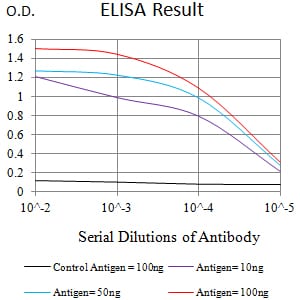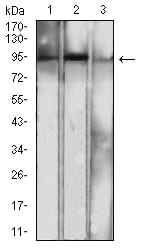

| WB | 咨询技术 | Human,Mouse,Rat |
| IF | 咨询技术 | Human,Mouse,Rat |
| IHC | 咨询技术 | Human,Mouse,Rat |
| ICC | 技术咨询 | Human,Mouse,Rat |
| FCM | 咨询技术 | Human,Mouse,Rat |
| Elisa | 1/10000 | Human,Mouse,Rat |
| Aliases | p52; p100; H2TF1; LYT10; CVID10; LYT-10; NF-kB2; p49/p100 |
| Entrez GeneID | 4791 |
| clone | 5E6A12 |
| WB Predicted band size | 96.7kDa |
| Host/Isotype | Mouse IgG1 |
| Antibody Type | Primary antibody |
| Storage | Store at 4°C short term. Aliquot and store at -20°C long term. Avoid freeze/thaw cycles. |
| Species Reactivity | Human,Mouse |
| Immunogen | Purified recombinant fragment of human NFKB2 (AA: 712-900) expressed in E. Coli. |
| Formulation | Purified antibody in PBS with 0.05% sodium azide |
+ +
以下是3篇关于NFKB2抗体的代表性文献,包含名称、作者及摘要核心内容概括:
---
1. **文献名称**: *"NFKB2 mutations in common variable immunodeficiency"*
**作者**: Chen K, et al.
**摘要**: 研究利用抗NFKB2抗体(Western blot/免疫荧光)分析了常见变异型免疫缺陷症(CVID)患者的NFKB2蛋白表达异常,发现CVID患者中NFKB2 C端截断突变导致其核转位功能受损,揭示了NFKB2在B细胞分化中的关键作用。
---
2. **文献名称**: *"A novel NFKB2 mutation in early-onset inflammatory bowel disease"*
**作者**: Klemann C, et al.
**摘要**: 通过抗NFKB2 p100/p52亚基特异性抗体的免疫印迹分析,发现早发性炎症性肠病(IBD)患者存在NFKB2基因杂合突变,导致p52加工缺陷,进而影响NF-κB信号通路调控肠黏膜免疫稳态的机制。
---
3. **文献名称**: *"Nuclear factor-κB2/p100 promotes endometrial carcinoma cell survival through upregulation of Bcl-xL"*
**作者**: Wang W, et al.
**摘要**: 研究使用抗NFKB2抗体(ChIP-seq和共聚焦显微术)证明,NFKB2/p100在子宫内膜癌细胞中通过直接结合Bcl-xL启动子区增强其表达,促进肿瘤细胞抗凋亡,为靶向NFKB2的癌症治疗提供依据。
---
以上文献均通过特异性抗体的实验手段揭示了NFKB2在不同疾病中的分子机制,涵盖免疫缺陷、炎症及癌症领域。如需具体发表年份或期刊信息可进一步补充。
Nuclear factor kappa B subunit 2 (NFKB2), a member of the NF-κB transcription factor family, plays a critical role in regulating immune responses, cell survival, and inflammation. The NF-κB pathway exists in canonical and non-canonical forms, with NFKB2 primarily involved in the non-canonical pathway. It is synthesized as a precursor protein (p100) that undergoes processing to generate the mature subunit (p52), which translocates to the nucleus to modulate gene expression. Antibodies targeting NFKB2 are essential tools for studying its expression, localization, and activation dynamics in physiological and pathological contexts.
NFKB2 antibodies are widely used in research to investigate diseases linked to NF-κB dysregulation, including immunodeficiencies, autoimmune disorders, and cancers. For example, mutations in NFKB2 are associated with common variable immunodeficiency (CVID) and early-onset endocrine abnormalities. These antibodies enable detection of both precursor (p100) and processed (p52) forms via techniques like Western blot, immunohistochemistry, and immunofluorescence. They also aid in exploring NFKB2's interactions with regulatory proteins (e.g., IκB, RelB) and its role in signaling pathways. Commercially available NFKB2 antibodies vary in specificity, often validated for cross-reactivity with homologs like NFKB1. Their applications extend to preclinical studies targeting NF-κB pathways for therapeutic interventions, emphasizing their importance in understanding immune regulation and disease mechanisms.
×